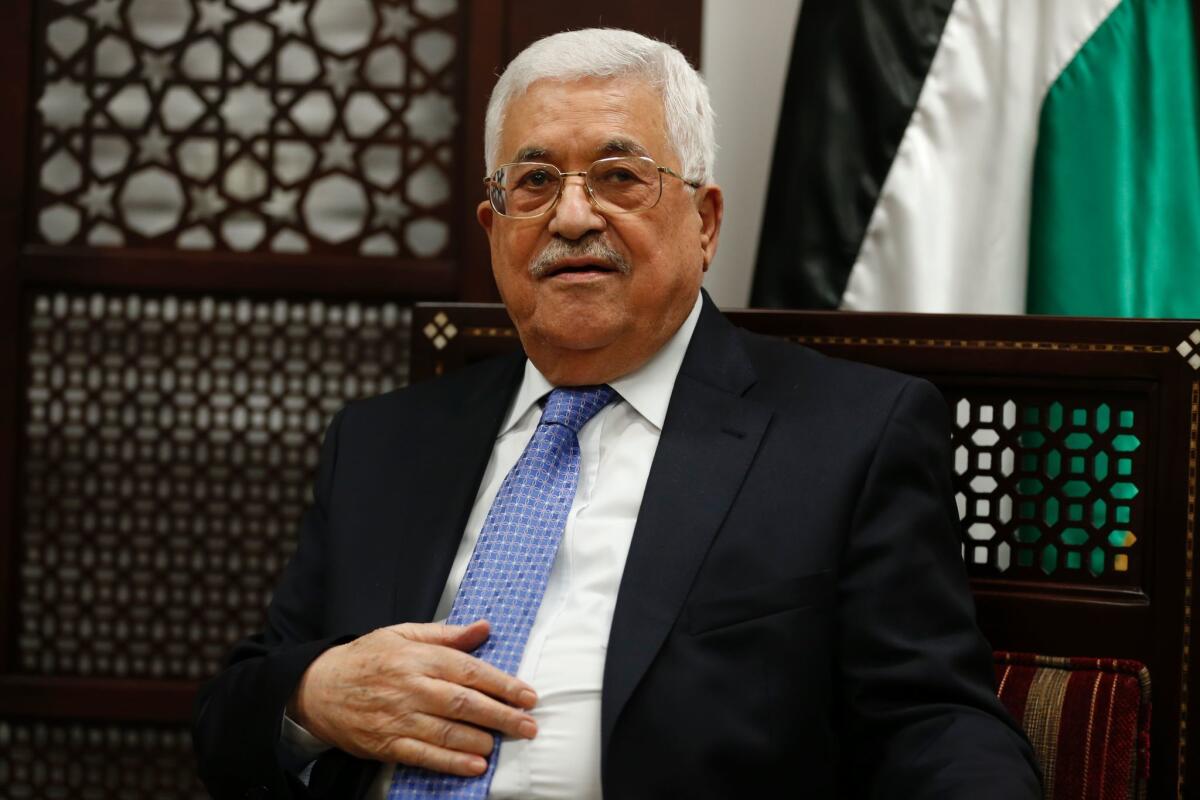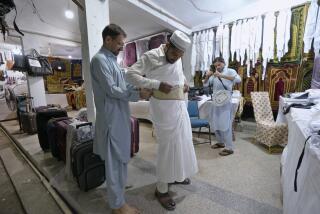Court postpones Palestinian elections indefinitely, a sign of growing tension with Hamas

- Share via
Reporting from Tel Aviv — The Palestinian Supreme Court indefinitely postponed municipal elections scheduled for Oct. 8, a surprise move that reflects infighting in Palestinian Authority President Mahmoud Abbas’ Fatah party, tension between Fatah and Islamic militants from Hamas and rising instability in Palestinian cities.
The state-run WAFA news agency on Thursday reported that the high court delayed the vote indefinitely because of unspecified complaints about voting preparations in the West Bank and Gaza Strip.
Palestinian political experts said the decision was probably prompted by pressure from Abbas, who has faced calls within his own party to cancel the vote amid concern it could open the door for political gains in the West Bank by Hamas.
Hamas made a surprise decision to participate after the Palestinian government in the West Bank called for elections in June. The elections were shaping up to be the first countrywide showdown at the ballot box between Hamas and Fatah since 2006, when residents of the West Bank and Gaza Strip handed the Islamists a surprise victory in parliament.
Hamas spokesman Sami abu Zuhri called the move a political decision. “We reject the decision to cancel the election,’’ he said in a statement.
Hamas’ violent seizure of the Gaza Strip in 2007 left Hamas and Fatah, the two leading factions in the Palestine Authority, in a state of estrangement and in control over separate territories. The result has been the atrophy in Palestinian politics. The enduring rift has defied several rounds of Arab-mediated reconciliation talks and undermined the authority’s ability to push for an independent state.
“Even a vote for a city council becomes a referendum on the state of the Hamas-Fatah rivalry,’’ said Grant Rumley, an expert on Palestinian politics at the Foundation for Defense of Democracies, a Washington think tank. The court ruling “was a convenient mechanism for Abbas. The prospect of Hamas gaining control of any cities in the West Bank was too much for him. And the end of the day, both parties view this as zero-sum competition.”
Abbas, who was elected president in 2005 to a four-year term, has never put himself up for reelection. The 81-year-old’s popularity is on the wane because of his failure to make progress in peace talks with Israel. Meanwhile, anticipation of a leadership vacuum after Abbas’ rule is over has given way to internecine struggles within Fatah over a successor that have further hobbled the party.
Tension has simmered for years between Abbas and Mohammed Dahlan, a former Palestinian security chief currently in exile in the Persian Gulf. Abbas has accused Dahlan of trying to overthrow his rule.
In northern West Bank cities over the last year, militants linked to Abbas’ Fatah party have launched increasingly brazen attacks on the Palestinian security forces, triggering waves of crackdowns by the security forces. When a Fatah militant leader was killed in Palestinian Authority police custody, tens of thousands of Palestinians turned out for a funeral that became an antigovernment protest.
“I called on the Palestinian Authority to postpone the elections,’’ said Jamal Tiwari, a Fatah legislator from the Balata refugee camp in Nablus who is a critic of Abbas, in an interview this week. “The security situation in the West Bank is not right for an election.”
Concern about Fatah’s rising vulnerability and potential gains by Hamas recently prompted four U.S.-allied Arab countries — Egypt, Jordan, Saudi Arabia and the United Arab Emirates — to press Abbas to reconcile with Dahlan. The Palestinian president rejected the call.
“From the very beginning, Fatah was not ready for elections. Fatah feared that the elections would reveal its internal problems,” said Nashat Aqtash, a communications professor at Birzeit University in the West Bank city of Ramallah who served as a consultant to Islamist candidates in 2006. “I am not surprised.”
The Palestinian Central Elections Commission said it had stopped preparations for the municipal vote and bemoaned the supreme court’s decision. It said a vote would help heal the internal political rift. In a statement, the commission said that although it respects the court’s decision, the panel “maintains hope for the democratic process, through elections, to be resumed soon,’’
Mustafa Barghouti, a legislator and reform activist, said the court ruling was unreasonable and appeared to have been influenced by politics. “We are worried that this looks like a plan to ensure that elections don’t take place,” he said. “Omitting local council elections is a negative sign.”
Mitnick is a special correspondent.
Special correspondent Rushdi abu Alouf in Gaza City contributed to this report.
ALSO
8 things you should know about Aleppo, including what it is
Iranian leaders criticize Saudi Arabia over last year’s deadly hajj crush and stampede
Dozens killed in multiple bomb blasts across Syria
More to Read
Sign up for Essential California
The most important California stories and recommendations in your inbox every morning.
You may occasionally receive promotional content from the Los Angeles Times.













